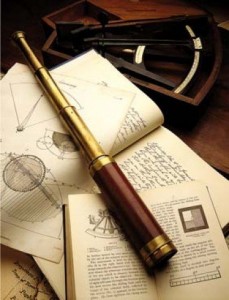I always find it fun when I talk to someone and it leads me to ideas I wouldn’t have had otherwise.

Last night at dinner my son asked if I’d written any more for my campaign. I told him about the campaign premise for Seekers of Lore, including the campaign cosmology, the difference between sandbox and not-sandbox play, and my plans for granting experience points (rewarding the behavior I want to encourage, discovery and recovery of what was lost).
He’s a quick young man, he generally anticipated exactly what I was going to tell him about. Which suggests it may be cliché, or just that it is a natural next step.
For instance, when I was describing the setting and how so many things were lost, he immediately asked if they could be found again. Well spotted, that’s the point.
Similarly, when I described how the elemental planes were formed, he asked if they were concentric spheres, with fire surrounding air surrounding water surrounding earth. Viewed one way, certainly… but considering the number of dimensions involved, they could be viewed in a fashion that means they aren’t.
He surprised me with an idea, though. I had earlier described how Amorphia changes things, Elder gods can survive direct contact with Amorphia, greater gods have the power to push it away (enough that they can create planes), lesser gods can hold it away from themselves enough to protect themselves for a time, and intermediate gods are a little more powerful, enough to protect themselves and shield others for a time, but not enough to create planes. During major Amorphic events the gods have much more power to work with individually, but may be forcibly changed by it, and possibly destroyed.
He later asked how big gods are, and I told him “probably as big as they want to be”. Here’s the bit that surprised me: “What if they are always the same size? What if they can’t change themselves? They can create chairs, but can’t become chairs. They can create worlds, but can’t change themselves at all. This might be why they don’t change back after Amorphia changes them, why they want to hide from it, to have shelter from it.”
I… huh, wow. That explains a lot, actually. I like it.
Are they fixed only physically, or in general nature? Mortals are capable of learning, or improving their character. But maybe that’s a specific thing that mortals can do….
What if that’s how you become a god in this setting? Many strange and wonderful beings were created from Amorphia, but nothing was permanent until the Elder gods came into existence… and tore out the part of their being that was variable, mutable, and hurled it away into the amorphic expanse. Now they were beings that could endure, something never seen before in the primal chaos.
Maybe that maelstrom that destroyed Paradise wasn’t quite a coincidence… what happened to the parts of the gods that were thrown away?
My current thoughts on the matter, though I have not thought about it hard:
My last paragraph was connected to the second: assuming arguendo that at least some of the elder gods tore out and discarded parts of themselves to make themselves immune to change… what became of the discarded bits while nobody was looking?
Dun dun duuuun
Ah, I see. I hadn’t considered it that way, I just assumed the elder gods formed that way, immune to the effects of Amorphia. Similarly, greater gods formed spontaneously and instinctively pushed Amorphia away to form planes, lesser and intermediate formed and could hold Amorphia back long enough to find safety with a greater god, and so on. I hadn’t really considered spontaneous gods like this ‘discarding’ parts of themselves to become less susceptible to change.
As for mortals who achieve apotheosis, I can see a stronger case there. Assuming the process of apotheosis aligns them with primal power, they gain abilities associated with them and I suppose the refinement process, such as it is, causes parts of them to be removed. For instance, a proto-god who associates with Law gradually loses the ability to be non-lawful and non-ordered, so those parts of him could be considered ‘removed’.
Hmm. The creation of a god of Law could thus imply an increase in Chaos somehow. The creation of a god of War could thus imply an increase in Peace somehow. I like the idea of inherent balance this idea suggests. It isn’t necessarily the case (becoming a god of Law might instead mean destroying the disorder within yourself), but the idea intrigues me.
Pingback: Building a Sandbox: Finding the Map | Keith Davies — In My Campaign - Keith's thoughts on RPG design and play.
Pingback: Lexicon and Microscope: Project Proposal | Keith Davies — In My Campaign - Keith's thoughts on RPG design and play.